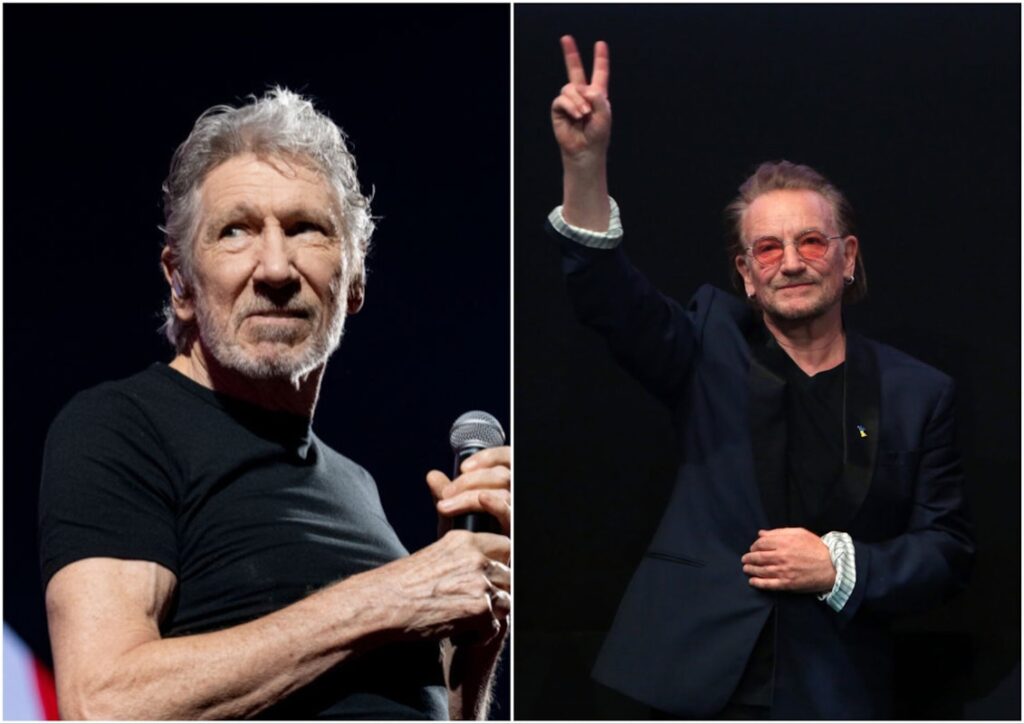Pink Floyd’s co-founder and the iconic 80-year-old rocker, Roger Waters, is no stranger to controversy. Known for his fervent anti-Israel rhetoric, Waters has again come under fire recently, as anti-Semitic attacks surge globally. His contentious position on the Israeli-Palestinian conflict, coupled with recent provocative comments about fellow rock icon Bono, have led many to view him not merely as a critic of Israel’s government but as an anti-Semite.
On October 7th, a brutal attack by Hamas led to the death of 1,200 lives and kidnappings of hundreds. In response, U2’s Bono, during a concert, modified the lyrics of his band’s ’80s hit, “Pride (In the Name of Love)”, as a tribute to the victims. Waters’ subsequent comments on Al Jazeera TV about Bono’s tribute were disparaging, igniting waves of backlash.
“If anybody who knows Bono should go and pick him up by his ankles and shake him until he stops being a [giant] s***…” Waters remarked disdainfully on-air. His dislike extended not just towards Bono but towards those endorsing Israel’s right to exist, which he derogatorily referred to as “the Zionist entity.”
In a previous interview with journalist Glenn Greenwald, Waters insinuated a conspiracy theory surrounding the Israeli government’s purported knowledge of the Hamas attacks prior. He also dismissed the gravity of these acts of terror, calling them a proportionate resistance to occupation.
While the waters of fairness and actuality seem murky to Waters, they are crystal clear for his former bandmate David Gilmour. In the past year, Gilmour promoted a documentary titled “The Dark Side of Roger Waters,” which alleges Waters’ anti-Semitic views based on interactions with Jewish musicians.
Waters’ history of controversial stage performances, including singing before an inflatable pig marked with the Star of David, and striding in a symbolic Nazi uniform, sends a chilling message. Despite these actions, unlike celebrities like Susan Sarandon and Roseanne Barr who faced significant repercussions for their remarks against Israel, Waters seems to have a controversial bubble of impunity.
Particularly disturbing is how other celebrities faced severe professional setbacks for offensive comments about Israel, like actress Susan Sarandon, who was at risk of being ‘canceled.’ Waters, with a history of inflammatory actions and comments, still enjoys a thriving career with minimal repercussions.
Recently, in an attempt to impose some form of accountability, Frankfurt’s City Council halted Waters’ planned concert in May 2023, citing his consistent attempts to boycott Israel culturally. The ruling, however, was overturned by the courts, reinstating his performance.
In the end, Waters’ actions and comments paint a concerning picture, raising questions about the line between legitimate political critique and hate speech. His enduring popularity poses a complex challenge to those who strive to uphold tolerance and acceptance within the global community, a challenge that must be met with boldness and uncompromising principles.
In today’s context, where anti-Semitic attacks are on the rise, the lack of a fitting response to Waters’ chronic actions hint at an ominous double standard. We are left to wonder – where must we draw the line, and when must accountability overshadow fame? On this note, we conclude, as we continue to grapple with these pressing questions about the expressions of our celebrated cultural icons. As the saying goes, with great power comes great responsibility, even if you are the co-founder of Pink Floyd.



